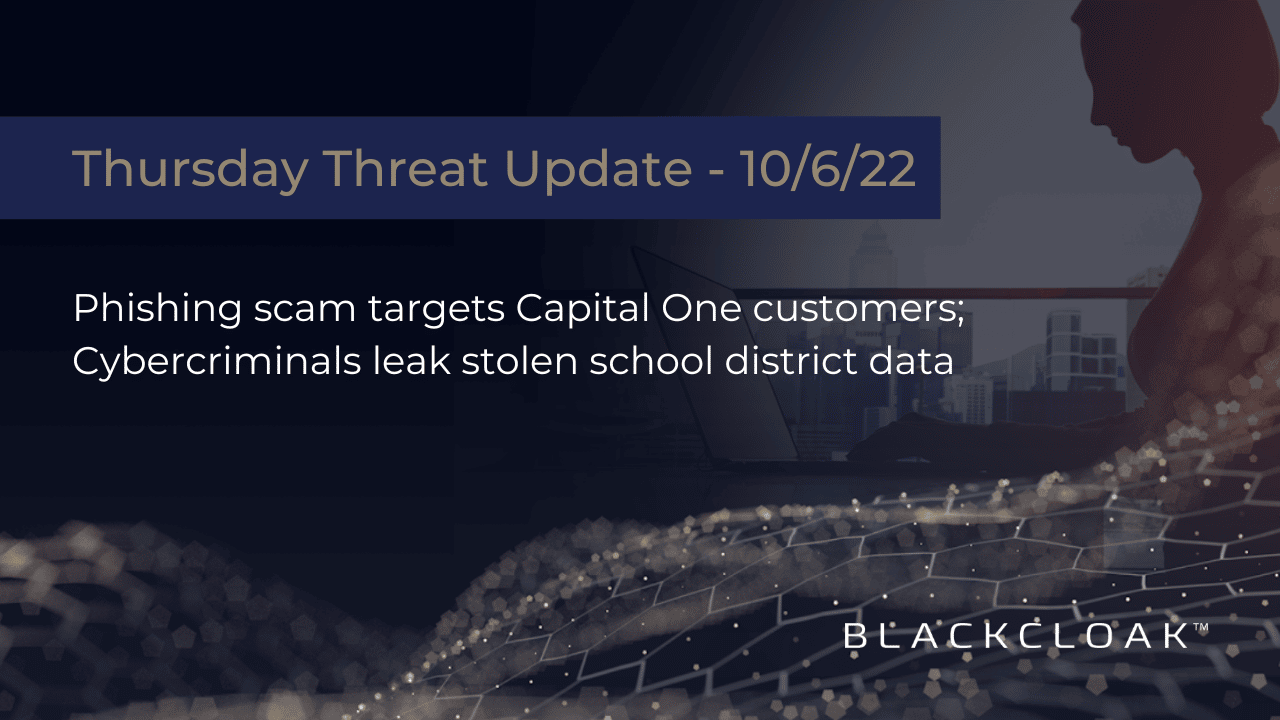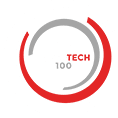Phishing scam targets Capital One customers; Cybercriminals leak stolen school district data

Cybercriminals continue to refine their phishing campaigns as they try to convince unsuspecting targets to turn over sensitive personal information.
As the world is getting wiser to their schemes, cybercriminals are evolving — they create phony emails and websites that look almost identical to the legitimate organizations they impersonate. And according to Vade, 34% of all phishing URLs in the first half of 2022 were impersonating financial institutions.
In this week’s BlackCloak Thursday Threat Update, we take a look at a recently discovered phishing campaign targeting customers of a popular credit card company, as well as a ransomware attack centered on a school district.
Phishing campaign targets CapitalOne customers
What we know: Cybercriminals have sent phishing emails imitating Capital One’s corporate account. The email asks the customer to provide a copy of any form of identification to ensure they are enrolled with Authentify, an online verification service that recently began a partnership with CapitalOne. The email contains a link to a phony website designed to look similar to CapitalOne’s, where they are taken to two additional pages that ask for the front and back of their identification.
Recommendations: It’s important to remember that no organization will ever ask you for personal information, login credentials, or money. If you are faced with one of these requests, do not engage with the communication. Additionally, anytime you receive a communication that conveys a sense of urgency, that’s another red flag. In this case, the email subject line for this phishing scam is “REMINDER: Your attention is required!” Cybercriminals will use tactics similar to this in an attempt to elicit a state of panic in hopes that you will move quickly and not consider whether the request is legitimate.
Cybercriminals leak data stolen from Los Angeles Unified School District
What we know: The superintendent of the Los Angeles Unified School District confirmed the release of personal data stolen by cybercriminals. The data was leaked after the school district decided it would not pay the ransomware group that stole the information. The Vice Society, the group behind the cyberattack, claims to have stolen more than 500 gigabytes of data. The compromised data may contain Social Security numbers and other personal information, as well as “confidential psychological assessments of students, contract and legal documents, business records, and numerous database entries,” according to law enforcement.
Recommendations: Given that Social Security numbers may have been stolen in the breach, it is highly recommended that victims place a credit freeze and fraud alerts on any affected accounts. In a statement, the Los Angeles Unified School District said it expects to provide credit monitoring services to anyone impacted by the incident in the coming days. The district has also set up a telephone number to answer any questions about the breach: 855-926-1129. Lastly, victims should be on the lookout for any suspicious messages. Cybercriminals may use personal information to try and conduct phishing attacks as well.
As cyber threats grow, everyone needs protection
These two incidents are just the latest examples why everyone needs some form of cyber protection. Whether it’s a school district or a credit card company, cybercriminals will do whatever they can to steal the data of everyone in your family. Luckily, there are steps you can take to protect yourself and your loved ones and minimize your overall cyber risk.
Learn how to protect your children’s privacy as they go online, how to identify and address scams targeting senior citizens, and the best ways to prevent you and your family from becoming victims of identity theft.









